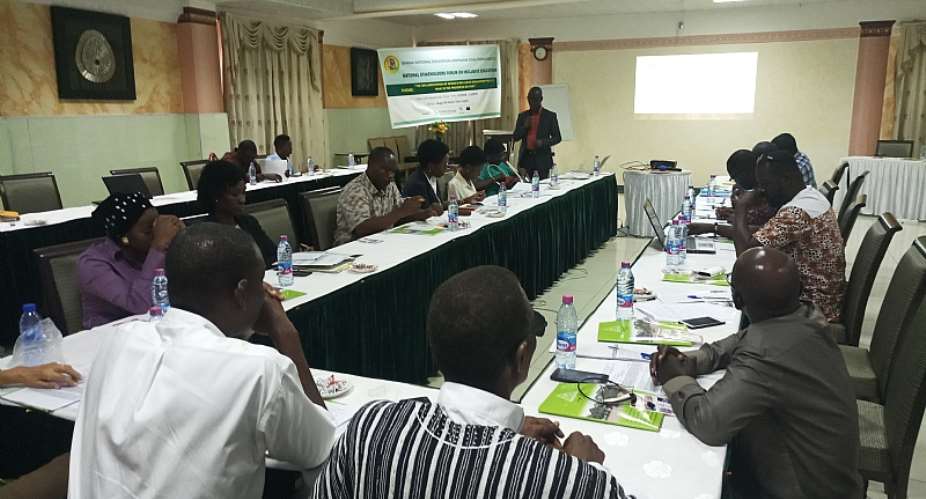The Dean of the Faculty of Educational Studies at the University of Education, Winneba, Professor Dr. Samuel Kweku Hayford has called for the need to train more specialists to design interventions that will help individuals with special needs achieve higher level of personal self-sufficiency to compete with their peers in the same classroom.
He said a research has indicated that special needs students educated in regular classes do better socially and academically than when they are being sent to non-inclusive settings or than their colleagues in special schools.
Prof. Hayford noted that special education specialist makes recommendations about learning strategies and teaching methods as well as provide direct instructions using alternative teaching materials and assistive technology.
Prof. Hayford noted that with the right support and intervention people with learning disabilities can succeed in school and be successful in life.
Prof. Hayford posited that the experience in Ghana compared to other countries indicates that more needs to be done to improve learning for children with special needs regarding towards an inclusive education.
He said this at the national stakeholder forum on Inclusive Education organized by the Ghana National Education Campaign Coalition (GNECC) under the theme, “The Implementation of Ghana’s Inclusive Education Policy: What is the Progress so Far?”
According to him, Inclusive Education will empower the kids because it will affords them the opportunity to acquire skills and knowledge for better qualification leading to better jobs and help them contribute to economic growth and reduce dependency in the country.
Inclusive Education is not only meant for children with impediments but targets every child adding that, it enables school drop outs, child labours chart a new path for themselves through their right to education.
The Director for Special Education at the Ghana Education Service (GES), Madam Amina Achiaa said the Inclusive Education policy ensures that every child or new entrance starting with Kindergarten 1 and P1 pupils are supposed to be screened on “My First Day at School” to identity their special needs.
She indicated that the 2017/2018 figures shows that 134,837 children have been screened of which 24,700 have been referred to various referral points for further assessment.
Madam Achiaa added that 18,310 children with special needs have been enrolled in special needs school as part of efforts towards the implementation of the Inclusive Education Policy.
She emphasized that the challenges includes large class size in most schools, inadequate infrastructure to conveniently accommodate all manner of persons, inaccessible school facilities, inadequate and inappropriate teaching, learning and assistive devices, lack of pedagogical skills of teachers in handling students with special needs and the neglect by parents have impeded learning outcomes.
Madam Achiaa called for the need to train and retrain teachers and school managers to understand the issues of Inclusive Education.
According to her, government must review all instructional materials and assistive devices for teaching and implementation of Inclusive Education in schools to promote sustainability.
Speaking on behalf of the Chairman of GNECC, Veronica Dzeagu, National Coordinator said Government must increase funding for inclusive education to at least 2% of the education budget in the 2019 for the effective implementation of the Inclusive Education (IE).
She noted that duty bearers at national, regional, district and school levels must comply fully with the Inclusive Education (IE) policy, minimum standards and guidelines.
Madam Vero intimated that strengthening of the capacity of citizens to hold duty bearers accountable for the effective implementation of the IE policy.
“And last but not least, working at changing attitudes and behaviours which reinforce stigma towards vulnerable children, especially children with disabilities,” she stated.





 Akufo-Addo commissions Phase II of Kaleo solar power plant
Akufo-Addo commissions Phase II of Kaleo solar power plant
 NDC panics over Bawumia’s visit to Pope Francis
NDC panics over Bawumia’s visit to Pope Francis
 EC blasts Mahama over “false” claims on recruitment of Returning Officers
EC blasts Mahama over “false” claims on recruitment of Returning Officers
 Lands Minister gives ultimatum to Future Global Resources to revamp Prestea/Bogo...
Lands Minister gives ultimatum to Future Global Resources to revamp Prestea/Bogo...
 Wa Naa appeals to Akufo-Addo to audit state lands in Wa
Wa Naa appeals to Akufo-Addo to audit state lands in Wa
 Prof Opoku-Agyemang misunderstood Bawumia’s ‘driver mate’ analogy – Miracles Abo...
Prof Opoku-Agyemang misunderstood Bawumia’s ‘driver mate’ analogy – Miracles Abo...
 EU confident Ghana will not sign Anti-LGBTQI Bill
EU confident Ghana will not sign Anti-LGBTQI Bill
 Suspend implementation of Planting for Food and Jobs for 2024 - Stakeholders
Suspend implementation of Planting for Food and Jobs for 2024 - Stakeholders
 Tema West Municipal Assembly gets Ghana's First Female Aircraft Marshaller as ne...
Tema West Municipal Assembly gets Ghana's First Female Aircraft Marshaller as ne...
 Dumsor is affecting us double, release timetable – Disability Federation to ECG
Dumsor is affecting us double, release timetable – Disability Federation to ECG
